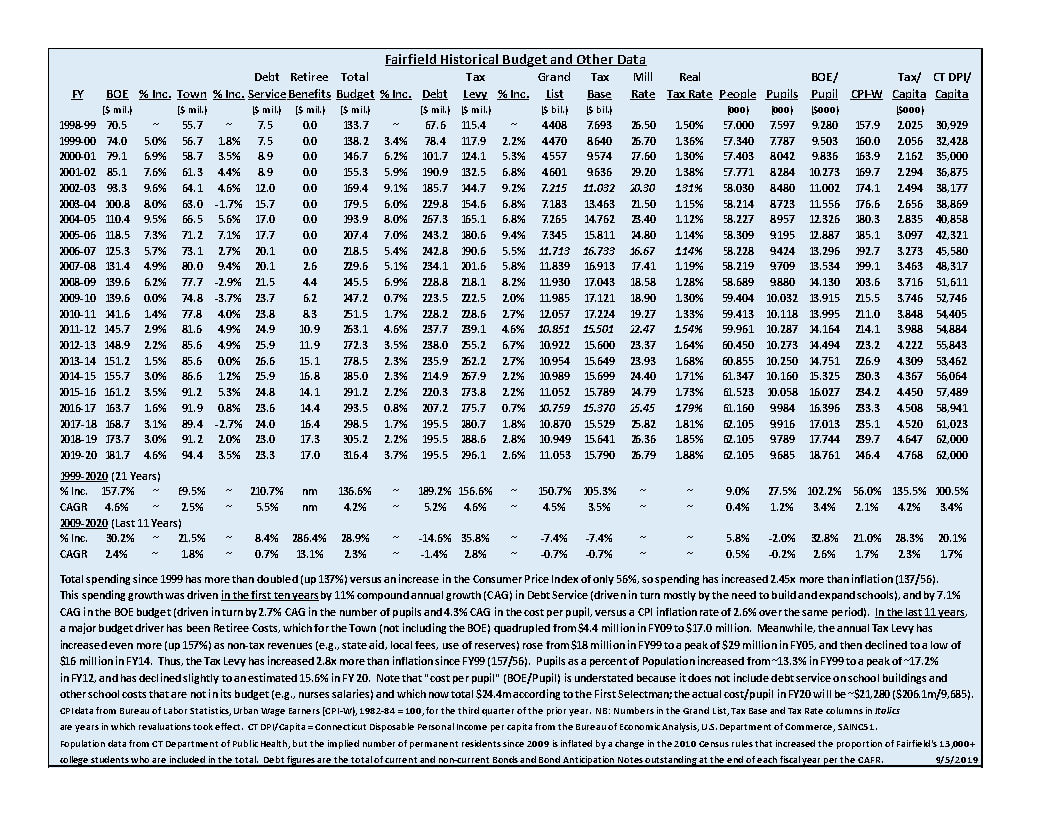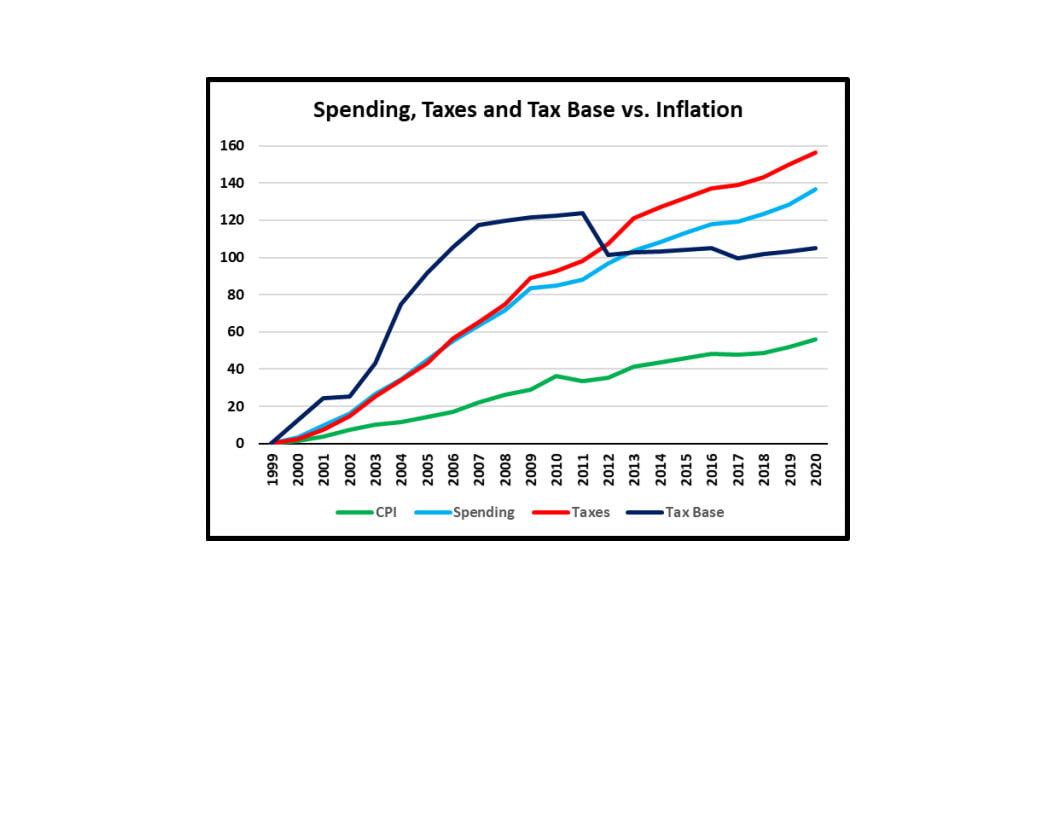Mill Rate Down, Millions In Cuts As Fairfield BOF Passes Budget
The question Wednesday night wasn't if the Board of Finance would cut the proposed Fairfield budget, but by how much. In the end, the body reduced the 2022 spending plan by about $2.3 million, leaving a total budget of roughly $333.4 million; a mill rate increase of 1.2 percent, down from 1.9 percent; and 5.6 percent gross tax levy growth, instead of 6.4 percent. After the board's adjustments, the levy is set to go up about $16.7 million year-over-year. The budget was approved along party lines, with Democrats Lori Charlton, Sheila Marmion and John Mitola dissenting.
Among the changes the board agreed upon was a $1.2 million reduction in surplus contributions, with the body adjusting the line item from $2.2 million to just above $1 million. Mitola pushed to cut the full $2.2 million. "I think for this year, in an attempt to reduce the tax burden on the taxpayers, it's important that we do this," he said. Patch 4.1.21
Among the changes the board agreed upon was a $1.2 million reduction in surplus contributions, with the body adjusting the line item from $2.2 million to just above $1 million. Mitola pushed to cut the full $2.2 million. "I think for this year, in an attempt to reduce the tax burden on the taxpayers, it's important that we do this," he said. Patch 4.1.21
No Tax Increase After RTM Cuts An Additional $1.1 Million
Residents will see no tax rate increase after the Representative Town Meeting cut more spending in the final version of the town budget, which passed earlier this week.
The majority of the $1,117,077 in cuts came from $924,924 in savings from school bus contracts in the Board of Education budget and fuel savings in multiple departments. The RTM also eliminated two vacant positions from the department of public works. The final budget totaled $317.2 million, less than a $1 million increase from the year before. According to First Selectwoman Brenda Kupchick, the budget is the first in more than three decades to not require a tax rate increase. “There were significant cuts made to the town side of the budget, and these reductions will present significant challenges to managing the town over the next year,” said Kupchick. “I look forward to working over the coming months to identify ways to improve efficiencies in our government while maintaining the services we are able to offer our residents.” Fairfield Citizen 6.4.20
The majority of the $1,117,077 in cuts came from $924,924 in savings from school bus contracts in the Board of Education budget and fuel savings in multiple departments. The RTM also eliminated two vacant positions from the department of public works. The final budget totaled $317.2 million, less than a $1 million increase from the year before. According to First Selectwoman Brenda Kupchick, the budget is the first in more than three decades to not require a tax rate increase. “There were significant cuts made to the town side of the budget, and these reductions will present significant challenges to managing the town over the next year,” said Kupchick. “I look forward to working over the coming months to identify ways to improve efficiencies in our government while maintaining the services we are able to offer our residents.” Fairfield Citizen 6.4.20
No Tax Rate Increase For Fairfield After RTM Cuts Budget By $1.1M
Fairfield's tax rate will not increase, after the Representative Town Meeting unanimously approved a budget Monday that included more than $1 million in cuts.
The town's final budget for 2021 came in at $317.2 million, a less than $1 million increase year-over-year. Before Monday's reductions, the proposed budget was $318.3 million, a number the Board of Finance approved after cutting $9.1 million in May. In recent weeks, town officials have had to adjust the budget, written before the coronavirus pandemic, to account for the virus' economic impact.
"This has been an extraordinarily difficult first six months," said First Selectwoman Brenda Kupchick, who took office in November, at the end of Monday's meeting, held via teleconference. "… I am proud that we were able to deliver a zero percent tax increase." Patch 6.2.20
The town's final budget for 2021 came in at $317.2 million, a less than $1 million increase year-over-year. Before Monday's reductions, the proposed budget was $318.3 million, a number the Board of Finance approved after cutting $9.1 million in May. In recent weeks, town officials have had to adjust the budget, written before the coronavirus pandemic, to account for the virus' economic impact.
"This has been an extraordinarily difficult first six months," said First Selectwoman Brenda Kupchick, who took office in November, at the end of Monday's meeting, held via teleconference. "… I am proud that we were able to deliver a zero percent tax increase." Patch 6.2.20
Millions In Cuts Approved For Fairfield Budget Amid Coronavirus
The so-called “cuts” to Fairfield’s FY21 budget by the Board of Finance last night were certainly constructive, limiting the tax rate increase at this point (we must still wait and see what happens to the final tax-collection-rate assumption on June 4th) to less than half of one percent (down from what started out as a 2.5% proposed increase).
However, the bad news is that most of the “cuts” were merely cost deferrals (like not funding the full ADEC (Actuarially Determined Employer Contribution) for the OPEB (Other Post Employment Benefits) fund, not replacing police, fire and DPW equipment that will still have to be replaced, bonding some paving costs instead of continuing to pay all of them as we go, using part of a projected BOE surplus this year to fund normal operating costs next year), and using (or not maintaining) reserves, all of which creates a huge budget “cliff” that will have to be climbed in FY22. A few proposed additions to staff on the Town side of the budget were eliminated, but no existing jobs were eliminated.
Unfortunately, absolutely nothing could be done about the major problem of continued relentless 4%-5% annual increases in compensation costs for public employees, which represents ~75% of total spending. And unfortunately, nothing could be done about the continued deterioration in CT’s economic condition (e.g., the recent COVID-19-related massive drop in the job numbers after 30+ years with zero job growth). For the State, which was already facing big budget deficits, the implications of COVID-19 are quite negative because of the implications for future tax revenues. Patch 5.12.20
However, the bad news is that most of the “cuts” were merely cost deferrals (like not funding the full ADEC (Actuarially Determined Employer Contribution) for the OPEB (Other Post Employment Benefits) fund, not replacing police, fire and DPW equipment that will still have to be replaced, bonding some paving costs instead of continuing to pay all of them as we go, using part of a projected BOE surplus this year to fund normal operating costs next year), and using (or not maintaining) reserves, all of which creates a huge budget “cliff” that will have to be climbed in FY22. A few proposed additions to staff on the Town side of the budget were eliminated, but no existing jobs were eliminated.
Unfortunately, absolutely nothing could be done about the major problem of continued relentless 4%-5% annual increases in compensation costs for public employees, which represents ~75% of total spending. And unfortunately, nothing could be done about the continued deterioration in CT’s economic condition (e.g., the recent COVID-19-related massive drop in the job numbers after 30+ years with zero job growth). For the State, which was already facing big budget deficits, the implications of COVID-19 are quite negative because of the implications for future tax revenues. Patch 5.12.20
Fairfield Proposed Budget Calls For 2.58% Tax Increase
The 2020-21 budget was released Monday morning and calls for a 2.58 percent tax hike to pay for an $11 million increase from the year before.
First Selectwoman Brenda Kupchick said the $327,497,024 budget was the first step in her multi-year plan to modernize Fairfield. “This vision encourages smart growth that offers urban-style amenities in order to attract the next generation of Fairfielders and businesses while still maintaining our New England charm,” Kupchick said. One of the changes Kupchick proposed, which she has discussed before, is purchasing software that will allow residents and businesses to apply and pay for permits online. Departments getting the software included Building, Planning and Zoning and Conservation. Fairfield Citizen 3.3.20
First Selectwoman Brenda Kupchick said the $327,497,024 budget was the first step in her multi-year plan to modernize Fairfield. “This vision encourages smart growth that offers urban-style amenities in order to attract the next generation of Fairfielders and businesses while still maintaining our New England charm,” Kupchick said. One of the changes Kupchick proposed, which she has discussed before, is purchasing software that will allow residents and businesses to apply and pay for permits online. Departments getting the software included Building, Planning and Zoning and Conservation. Fairfield Citizen 3.3.20
Moody’s Praises Connecticut’s Budget Reserves But Knocks Transportation Infrastructure
FT notes this excerpt: “The hobbled economy places the state at a disadvantage when competing with other states for business and residents.”
With no job growth for 30 years, CT still has not figured out how to grow its economy, and the nice $2.8 billion Rainy Day Fund is now, by coincidence, offset by and equal to the official projected budget deficits for fiscal years ‘22, ‘23 and ‘24 — none of which assumes a national recession, which some think is overdue and likely. CT News Junkie 12.17.19
With no job growth for 30 years, CT still has not figured out how to grow its economy, and the nice $2.8 billion Rainy Day Fund is now, by coincidence, offset by and equal to the official projected budget deficits for fiscal years ‘22, ‘23 and ‘24 — none of which assumes a national recession, which some think is overdue and likely. CT News Junkie 12.17.19
Deficit Forecasts, Economic Concerns Spark New Calls for Spending Reforms
Connecticut faces major budget deficits approaching $3 billion through the next five fiscal years, generating renewed calls for state spending reforms. New reports from the legislature's nonpartisan budget office and the governor's Office of Policy and Management forecast a $29.7 million deficit for the current year, a $183.8 million surplus for fiscal 2021, and then three straight years of red ink.
"One thing's for certain—we cannot afford to tax our way out of another budget crisis," says CBIA's Eric Gjede, noting that the 2011 and 2015 tax hikes - two of the biggest in Connecticut's history - failed to stabilize the state's fiscal situation. CBIA 12.12.19
"One thing's for certain—we cannot afford to tax our way out of another budget crisis," says CBIA's Eric Gjede, noting that the 2011 and 2015 tax hikes - two of the biggest in Connecticut's history - failed to stabilize the state's fiscal situation. CBIA 12.12.19



